#vigilantism
Text
A federal judge in Wisconsin ruled Wednesday that a wrongful death lawsuit filed by the father of a man shot and killed by Kyle Rittenhouse during a protest in 2020 can proceed against Rittenhouse, police officers and others.
The father of Anthony Huber, one of two men shot and killed by Rittenhouse, filed the lawsuit in 2021, accusing officers of allowing for a dangerous situation that violated his son's constitutional rights and resulted in his death. Anthony Huber's father, John Huber, also alleged that Rittenhouse, who was 17 at the time of the shootings, conspired with law enforcement to cause harm to protestors. John Huber is seeking unspecified damages from city officials, officers and Rittenhouse.
U.S. District Judge Lynn Adelman on Wednesday dismissed motions filed by Rittenhouse and the government defendants seeking to dismiss the civil rights lawsuit.
In allowing the case against Rittenhouse and the others to proceed, the judge said that Anthony Huber's death "could plausibly be regarded as having been proximately caused by the actions of the governmental defendants."
Rittenhouse attorney Shane Martin said in a phone interview that it's important to note the ruling doesn't address the merits of the case, it only allows it to proceed to the next phase.
"While we respect the judge's decision, we do not believe there is any evidence of a conspiracy and we are confident, just as a Kenosha jury found, Kyle's actions that evening were not wrongful and were undertaken in self defense," Martin said.
Attorneys and private investigators for John Huber spent over 100 hours trying to locate Rittenhouse, tracking down addresses in seven states before they found the home of his mother and sister in Florida. The lawsuit was served on Rittenhouse's sister, who said that he wasn't home. Adelman said that was sufficient to qualify as being served.
Rittenhouse had argued that the case against him should be dismissed because he wasn't properly served with the lawsuit. Adelman dismissed that, saying that Rittenhouse "is almost certainly evading service."
"Rittenhouse has been deliberately cagey about his whereabouts," Adelman wrote. "Although he denies living in Florida, he does not identify the place that he deems to be his residence."
Attorneys for the law enforcement and government officials being sued did not immediately return emailed messages seeking comment.
The ruling puts Anthony Huber's family "one step closer to justice for their son's needless death," said Anand Swaminathan, one of the attorneys for parents John Huber and Karen Bloom.
"The Kenosha officials that created a powder keg situation by their actions tried to claim that they cannot be held accountable for their unconstitutional conduct; that argument was soundly rejected today," Swaminathan said in a statement.
Rittenhouse was charged with homicide, attempted homicide and reckless endangering for killing Anthony Huber and Joseph Rosenbaum and wounding a third person with an AR-style semi-automatic rifle in the summer of 2020 during a tumultuous night of protests over the shooting of a Black man, Jacob Blake, by a white Kenosha police officer.
Rittenhouse was acquitted of all charges in November 2021 after testifying he acted in self-defense. Rittenhouse's actions became a flashpoint in the debate over guns, vigilantism and racial injustice in the U.S.
Rittenhouse went to Kenosha from his home in nearby Antioch, Illinois, after businesses were ransacked and burned in the nights that followed Blake's shooting. He joined other armed civilians on the streets, carrying a weapon authorities said was illegally purchased for him because he was underage.
Rittenhouse first killed Rosenbaum, 36, in the parking lot of an auto dealership and as Rittenhouse ran from the scene he stumbled and fell. Anthony Huber, 26, struck Rittenhouse with his skateboard and tried to disarm him. Rittenhouse fell to the ground and shot Anthony Huber to death and wounded demonstrator Gaige Grosskreutz, 27.
This case is one of several ongoing civil lawsuits filed in the wake of the shootings. Grosskreutz last year filed a similar lawsuit against Rittenhouse.
Rittenhouse has maintained a high public profile, particularly on social media, where he is an outspoken advocate for gun rights. He has nearly 1 million followers on Twitter and has spoken at conservative gatherings.
#us politics#news#abc news#abc 7 Chicago#ap news#2023#kyle rittenhouse#kenosha#kenosha protests#gun violence#gun rights#vigilantism#racial injustice#2020 protests#Wisconsin#Anthony Huber#Anand Swaminathan#John Huber#Shane Martin#Judge Lynn Adelman#wrongful death lawsuit
193 notes
·
View notes
Text
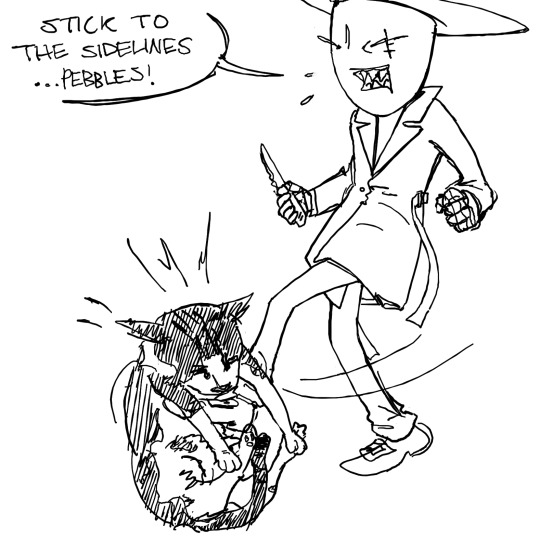
64 notes
·
View notes
Text
Why don't more crossover fics have Peter as a vigilante in the world of MY Hero Academia? Peter would never support a system where heroes are commercialised and ranking high on a leaderboard is more important than helping people.
At the very least, if you want to make him a student have him be reluctant about it or have him confront his teachers about the errors of their society.
#marvel#peter parker#spider man#spiderman#my hero academia#mha#boku no hero academia#bnha#hero society#vigilantism#u.a. high school#crossover#marvel crossover#mha crossover
27 notes
·
View notes
Note
How have superhero stories grappled with the more grounded depictions of fighting crime? Which is to say, someone with much higher power than those they’re fighting breaking bones and causing harm in real circumstances?
It’s like there’s a disconnect between some of the more “straight” stories of someone who is seemingly nice on every level as a hero but goes out during their nights to beat the hell out of people with their alter ego and power , and ofc how that image links with punitive justice / brutality status quo of justice enforcement
On the worst end, you get Rorschach’s (part of the point of the character I know) who throw suspected criminals down elevator shafts, and on the best end you get spidey or flash harmlessly webbing guys up or tying them up before they can hurt anyone
Ideally you’d get heroes going out to defend others lives and doing so in as non harmful ways as possible and incapacitating without violence, and addressing the root issues of criminals at the same time (inspired by your Batman post) while putting thr buck of energy towards the real masters of evil propagating the system
One of my favorite recent stories was the Zdarsky daredevil where it shows how easily a fatal accident can happen in a normal fight, and how dangerous any kind of violence is, but I’m not sure how much of an outlier / regular that is.
Maybe vague, but what I’m getting at is how, if at all, has this trend changed in superheroes over the years? And how successfully have they grappled with the “Ka pow” solution and what would actually come of it?
I've talked about this a bit in the past with regards to Batman (although I think the Punisher is the better case study) and vigilantism in general.
I think it's genuinely important that superheroes avoid the trap of "Spidercop" et al. (the Playstation Spider-Man games really pissed me off on this topic, as amazing as they are in other aspects) and grapple with what it means to be a vigilante in society, both the good and the bad of it.
That being said, though, I think this is basically a solved issue in superhero comics and has been practically since the beginning.
Building off their initial focus on organized crime coming out of the pulps - because pace to my abolitionist and restorative justice brethren, but that shit does not work on mobsters - superhero comics pivoted by creating the supervillain.
While many supervillains get their start as exaggerations of the organized crime figure, and there are some great punch-clock villains out there, most supervillains exist outside of the framework of criminal justice reform because their motivations are usually sui generis and their criminal activities are so baroque and often have more to do with personal vendettas and dominance displays than anything that actually motivates real-world violent crime.
22 notes
·
View notes
Text

Taxi Driver (1976, Martin Scorsese)
28/01/2024
Taxi Driver is a 1976 film directed by Martin Scorsese, written by Paul Schrader and starring Robert De Niro. Set after the Vietnam War in New York, it is about a vigilante with neo-noir and psychological detective elements.
The screenwriter Paul Schrader stated that he was inspired for the film's themes by European existentialism and in particular by Jean-Paul Sartre's Nausea and Albert Camus' The Stranger, as well as by the story of Arthur Bremer, who attempted in 1972 to assassinate Democratic US presidential candidate George Wallace. Particularly notable is the performance of Robert De Niro, defined by the American journalist Robert Kolker as "the last of the noir heroes in the noisiest world imaginable". The very young Jodie Foster won two BAFTAs in 1977 as Best New Actress and Best Supporting Actress (also for Bugsy Malone).
The film won the Palme d'Or at the 29th Cannes Film Festival in 1976 and was nominated for four Academy Awards, including the Best Film category in 1977. The American Film Institute placed it 52nd among the 100 best films of all time, while it ranked 17th on the list of the 500 best films in history according to the British magazine Empire. In 2012 it was placed in 31st place, ex aequo with The Godfather - Part II, in the ranking of the best films of all time drawn up by critics and published by the English magazine Sight and Sound, while in that drawn up by directors it found itself in fifth place. In 1994 it was chosen for preservation in the National Film Registry of the United States Library of Congress.
#taxi driver#film#1976#martin scorsese#screenplay#paul schrader#robert de niro#vietnam war#new york city#vigilantism#neo noir#psychological thriller#existentialism#nausea#jean paul sartre#the stranger#albert camus#Arthur Bremer#george wallace#united states#jodie foster#British Academy of Film and Television Arts#1977#bugsy malone#palme d'or#1976 Cannes Film Festival#academy awards#Academy Award for Best Picture#49th Academy Awards#American Film Institute
16 notes
·
View notes
Text
If Arlo, John and Seraphina became vigilants
Seraphina: (using her communication earpiece) Arlo, why the hell did you let John go off alone during the mission? What if he looses control and end up-
Arlo: You're not the boss of me
Seraphina: (glaring) What?
John: Laughing his ass off while beating the sh*t out of some criminals.
RIP Arlo
#unordinary#incorrect quotes#unordinary webtoon#unordinary seraphina#unordinary arlo#unordinary john#vigilantism
11 notes
·
View notes
Text
realized yall havent met Des yet
my character for evigheden :DDD
so her full name is Desdemona Brooks and they use she/they
kinda ehhh on how they look but she's really butch, short black hair and a lot of ear piercings.
They're a retired villain!!! shes got a toxic gf named mira who broke up with them via trying to kill her and take over their criminal empire
they acquired said criminal empire when she killed the man who kidnapped them for her powers
said powers are others powers dont work on them :D
morality wise ehhh she's killed but only out of neccessity. they think of herself as really a worse person than she actually is because of said txic gf
hmmm what else
OH YES so plotwise shes gonna be a mentor to Carlos!! and they will absolutely not be dying thank you very much but she might lose her dominant hand.. so no more fighting as well...
#evigheden#Desdemona Brooks#Vigilantism#tw toxic#des is my beloved#and her love language is gifts#and she loves pearls#did i mention they have ear piercings up to cartilage#e v i g h e d e n
6 notes
·
View notes
Text
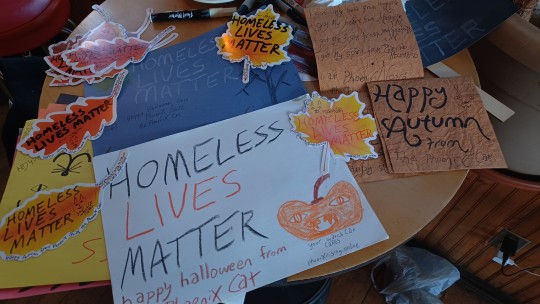
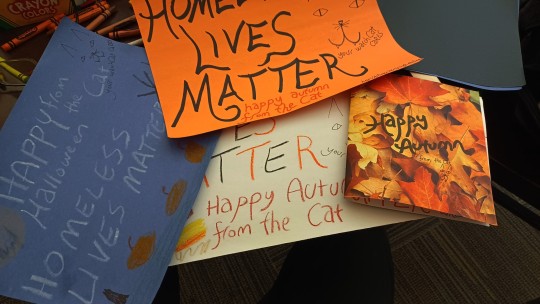
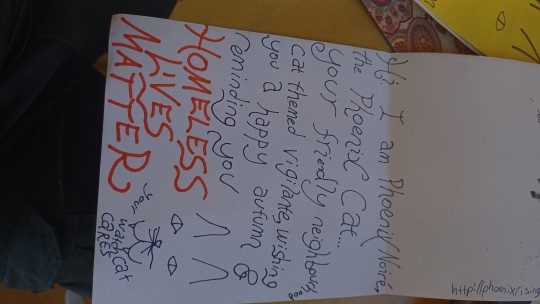


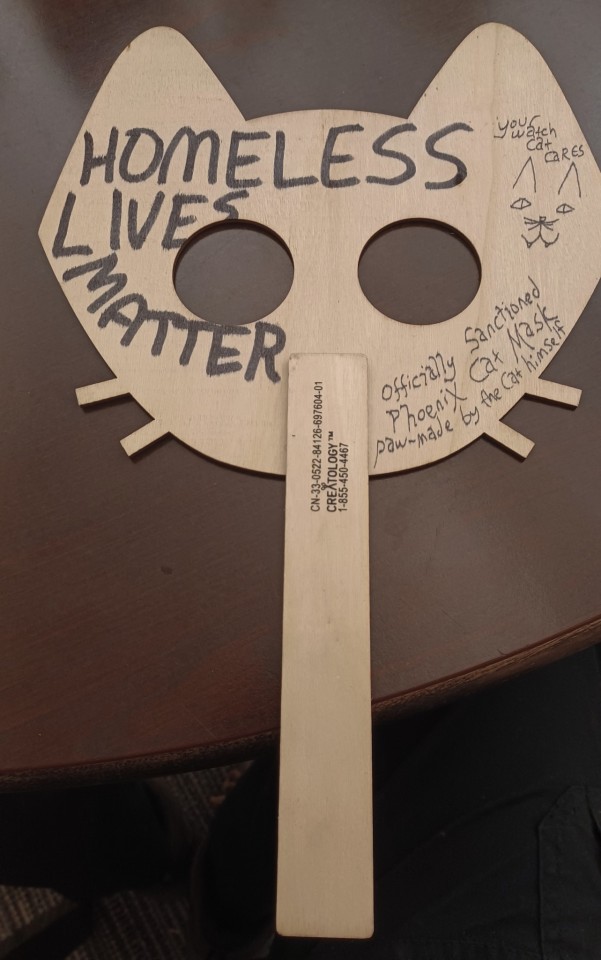
Unfortunately, I got arrested to keep me from sharing these, and then they were stolen along with my car and everything I owned while I was in jail. But, fortunately, I did take some shots of it first, so all that work wasn't completely wasted.
#homelesslivesmatter#homeless lives matter#vigilantism#eat the rich#publicservice#public servant#public service#fuck the police#acab#fight for justice#fight back#do the right thing#blue lives don't matter#blue lives murder#do what you can#be the change you want to see in the world
7 notes
·
View notes
Note
How does Ryuko talk to Izuku while he is in his vigilante phase?
She would attempt to reason with Izuku, as she would like his new approach at first. But then sees how it's affecting his friends, family, and lastly himself. Ryuko would attempt diplomacy first but would end up fighting him as a last resort. She understands Midoriya's side of things but would insist that he stops the path he's on.
#answer#answered#answer posting#headcanon#crossover#crossover au#crossover ship#crossover shipping#crossover headcanons#kill la kill#my hero academia#boku no hero academia#ryuko matoi#matoi ryuuko#midoriya izuku#izuku midoriya#deku#vigilante deku#vigilantism
27 notes
·
View notes
Text
Vigilantism is here defined as "acting in an unofficial or unlawful way to prevent crime, or to catch and punish criminals". Vigilantes may be lone individuals or organised groups, and vigilantism is often attempted when communities have lost faith in the organisations, such as the police, ostensibly responsible for protecting them.
32 notes
·
View notes
Link
From the April 24, 2024 opinion piece:
“The nascent pogroms at Columbia have to stop TODAY, before our Jewish brethren sit for Passover Seder tonight. If Eric Adams won’t send the NYPD and Kathy Hochul won’t send the National Guard, Joe Biden has a duty to take charge and break up these mobs.”—a Monday tweet from Republican Arkansas Sen. Tom Cotton
...
The recent rise in American antisemitism, on campus and off, is very real. But Cotton and his ilk are much less interested in addressing that than they are in demonizing protesters (many of whom are themselves Jewish) angered by Israel’s brutal ravaging of Gaza and pushing Columbia University to divest its endowment, and any other investments, from Israeli-linked businesses and institutions.
...
Just a scanning of Cotton’s words outside newsprint should be more than enough to dispel any notion that the far-right senator is interested solely in law and order. Last week, after pro-Palestinian protesters blocked highways in major cities, Cotton tweeted out a lie that these dissenters were “pro-Hamas” and “encouraged” those stuck in the ensuing traffic to “take matters into your own hands”—before editing the tweet to add that people should “take matters into your own hands to get them out of the way.” Back in 2020, the country saw a rash of vigilante drivers purposefully ramming into peaceful anti–police brutality protesters. So there’s not really much ambiguity as to what Cotton wants vigilantes—or the troops—to do, especially as cops clad in riot gear have begun to descend on other universities.
2 notes
·
View notes
Text
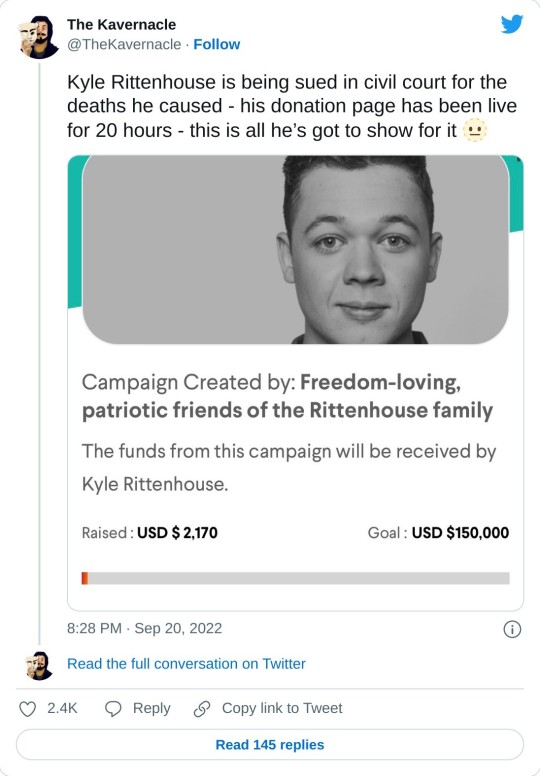


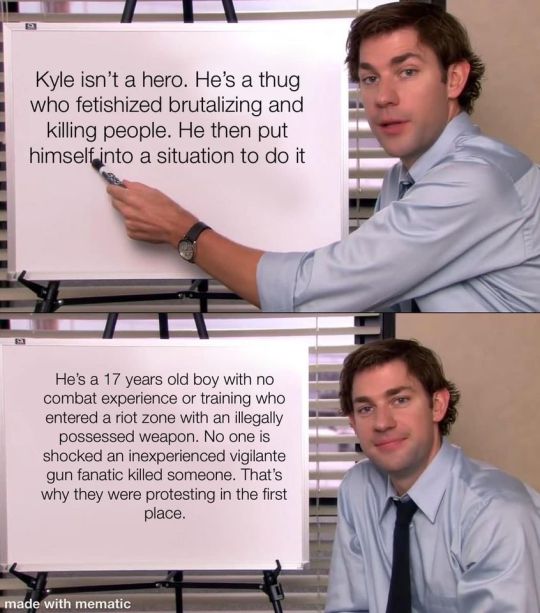

#us politics#2022#twitter#tweet#@thekavernacle#republicans#conservatives#kyle rittenhouse#kenosha shooter#legal defense fund#givesendgo#fuck kyle#alt right#vigilantism
88 notes
·
View notes
Text
https://jjie.org/2020/11/16/sex-offender-registration-doesnt-help-victims-hurts-young-offenders
Opinion: Sex Offender Registration Doesn’t Help Victims, Hurts Young Offenders
Jason was 14 years old when he met his first girlfriend, a 13-year-old neighbor of the foster family with whom he lived. After a few months of dating, his girlfriend’s mother walked in on the teenagers engaging in consensual oral sex and called the police. Jason was arrested and charged with child molestation. He was adjudicated delinquent in juvenile court and placed on the California Sex Offender Registry. Before he was old enough to drive, Jason was branded a sex offender on a public, searchable website.
Now in his 30s, Jason suffers from depression and has experienced homelessness. Despite earning a college degree, he cannot find steady employment. An internet search shows he is a registered sex offender.
Jason is like many others who struggle to lead a healthy adult life because of a juvenile adjudication based on unsurprising adolescent behavior. States across the country place children as young as 8 years old on sex offender registries for conduct that is otherwise developmentally normal.
Required by federal law, this label imposes barriers on young people’s access to education, employment and safe housing. It can devastate them psychologically with little benefit to the community.
Youth sex offender registration costs the public over $3 billion a year. Rather than investing in preventive programming and victims’ services, resources are routinely allocated to a carceral and punitive response. Meanwhile, research-backed social programming and community needs remain largely underfunded.
For example, in 2017 California spent $140 million to register and monitor 3,500 youth registrants. Yet that same year, the budget for prevention programs and victims’ services was only $46,000.
In addition to the high cost of registration, sex offender registries do not advance the public safety goals for which they were created. Only 3% to 5% of youth who commit sexual offenses are likely to reoffend, showing that registration wastes resources on individuals who pose little to no risk of future harm.
State rules hard to understand
Youth are required to register as sex offenders for a wide range of offenses, including consensual sexual relationships, sexting and public urination. These laws have a disproportionate impact on marginalized communities. Laws that criminalize consensual same-sex relationships disproportionately target LGBTQ youth. Racial bias in charging and sentencing can also lead to greater numbers of Black and brown youth on the registry.
A recent report by Juvenile Law Center shows that 39 states place children on sex offender registries. The registration procedure and consequences vary widely from state to state. Youth can be required to register for their entire lifetime in some states, which dooms them to a life on the margins.
Indeed, once labeled a sex offender, the stigma remains regardless of how long the registration period lasts; web-based information and databases often remain online and accessible even if the period of registration has long since ended. These registration laws completely disregard the rehabilitative purpose of the juvenile justice system.
Today, approximately 200,000 individuals are on sex offender registries for offenses committed prior to age 18. Registered youth face harsh restrictions that regulate where they can live, work or attend school. Some states prohibit such youth from residing with other children in the home, which can preclude youth from living with siblings or their own children or partner’s children. Registration can also prohibit youth from living within a church or school zone, effectively prohibiting them from practicing their religion or receiving an education.
State registration laws are complex and difficult even for most adults to understand. Yet youth are expected to understand and comply with the numerous restrictions and reporting requirements, despite the many practical challenges of doing so. States require youth to update and verify their information regularly, including when any information has changed.
If a youth is traveling between states or even within counties in their own state, they may have to report or register. When they are unable to comply with the complex and untenable registration and reporting requirements, they can face fines, incarceration and extended registration.
Additionally, many states require information about registered sex offenders to be posted on a public website, made available at local police stations or disseminated to the youth’s communities. This community notification often results in humiliation and social ostracism—even vigilante violence in some cases—and imposes a negative self-image upon the youth.
Children on sex offender registries are four times more likely to report a recent suicide attempt compared to nonregistered children who have engaged in harmful or illegal sexual behavior. Stigmatization from sex offender labeling frequently deprives youth of vital sources of psychological support at the precise time they most need community acceptance. And, in many cases, that support is not publicly funded or accessible to those who need it.
The draconian practice of youth sex offender registration imposes an unending loop of barriers and obstacles on youth without improving public safety. It also needlessly shifts resources away from important services such as sexual violence prevention and victim assistance. That is why the time is now to abolish the harmful practice of placing youth on sex offender registries.
Malik Pickett, Esq. is a staff attorney at Juvenile Law Center, where he advocates for the rights of youth in the juvenile justice system through litigation, amicus and policy advocacy efforts.
Emily Satifka, Esq. is a Zubrow Fellow at Juvenile Law Center where her work currently addresses the harms young people experience from sex offender registration, and inhumane conditions of confinement. Her legal career is focused on dismantling oppressive and violent systems through litigation, education and policy advocacy.
#repost of someone else’s content#article#ageism#adultism#youthlib#youth rights#youth liberation#vigilantism#leftism#anarchism#abolition#prison abolition#sex offender registry#SORA#SOR abolition#registry abolition#the carceral state#carceralism#abuse cw#youth abuse cw#child abuse cw#suicide cw
45 notes
·
View notes
Note
Ask
Vigilante Crossover
How does Anko and Hana take Deku fighting outside the system? Do they support it, or not?
Anko is very much fine with Deku fighting outside the system as she doesn't have much faith in the system due to it corruption and incompetence in bringing true justice.
While Hana very much disapprove of how Deku taking the law by his hand and how it cause more problem than it solves.
#naruto#hana inuzuka#anko mitarashi#my hero academia#izuku midoriya#midoriya izuku#deku#super au#super au ask#vigilante au#vigilante au ask#tw: vigilantism#vigilantism#crossover au#crossover au ask
6 notes
·
View notes
Text
Republican lawmakers in Texas want to create a state security force to patrol the US-Mexico border that critics have characterised as a "vigilante death squad policy."
Dade Phelan, the Republican speaker of Texas' House of Representatives, told a meeting of the Texas Public Policy Foundation that he plans to introduce a bill that he says will "make national headlines and change the conversation on border security," according to The Intercept.
The bill — House Bill 20 — would allow Texas' Department of Public Safety to hunt, arrest, and deport undocumented migrants.
The group would be comprised of law enforcement officers and civilians under the direction of a governor-selected chief. The members of the group would also be extended immunity from criminal prosecution relating to their actions on the border. They will be directed to "arrest, detain, and deter individuals crossing the border illegally including with the use of non-deadly force."
The group will also apparently be authorised to "use force to repel, arrest, and detain known transnational cartel operatives in the border region."
A piece of companion legislation would make undocumented entry into Texas a state crime, with first-time offenders subject to a year in prison, two years in prison for second-time offenders, and life in prison for individuals with prior felony convictions.
Democrats in Texas are opposed to the bill, likening the legislation to a "vigilante death squads policy."

“This dangerous, radical, and unconstitutional proposal which empowers border vigilantes to hunt migrants and racially profile Latinos is going to result in the death of innocent people,” Victoria Neave Criado, the Democratic chair of Mexican American Legislative Caucus, said in a statement last week. “MALC is going to do everything in our power to kill this legislation just as Latino State Representatives for the past 5 decades have fought against Klan-like proposals.”
Mr. Phelan anticipated the opposition, and claimed he was prepared to take the matter to the conservative-majority Supreme Court if Democrats challenge the law.
This isn't the first time the state has tried to create a border protection force beyond the federal US Customs and Border Protection agency. In 2021 Republican Governor Greg Abbott initiated "Operation Lone Star" that placed National Guard troops at the border. However, the $4bn endeavor was met with numerous controversies, including the deaths of several National Guard members, some to suicide, and allegations of human rights violations that resulted in a Justice Department investigation.
The operation has shown no notable difference in the rate of undocumented border crossings or transnational drug trafficking.
If the case is challenged and successfully survives a Supreme Court ruling, it would change the way all border states could police the southern border.
#us politics#news#the independent#texas#us mexico border#us border patrol#border security#gov. greg abbott#vigilantism#vigilante justice#bounty hunters#Dade Phelan#Texas House of Representatives#Texas Public Policy Foundation#republicans#conservatives#gop#gop platform#gop policy#nazis#fascism#fascists#The Intercept#House Bill 20#Texas Department of Public Safety#us customs and border protection#Mexican American Legislative Caucus#Victoria Neave Criado#us supreme court
9 notes
·
View notes
Text
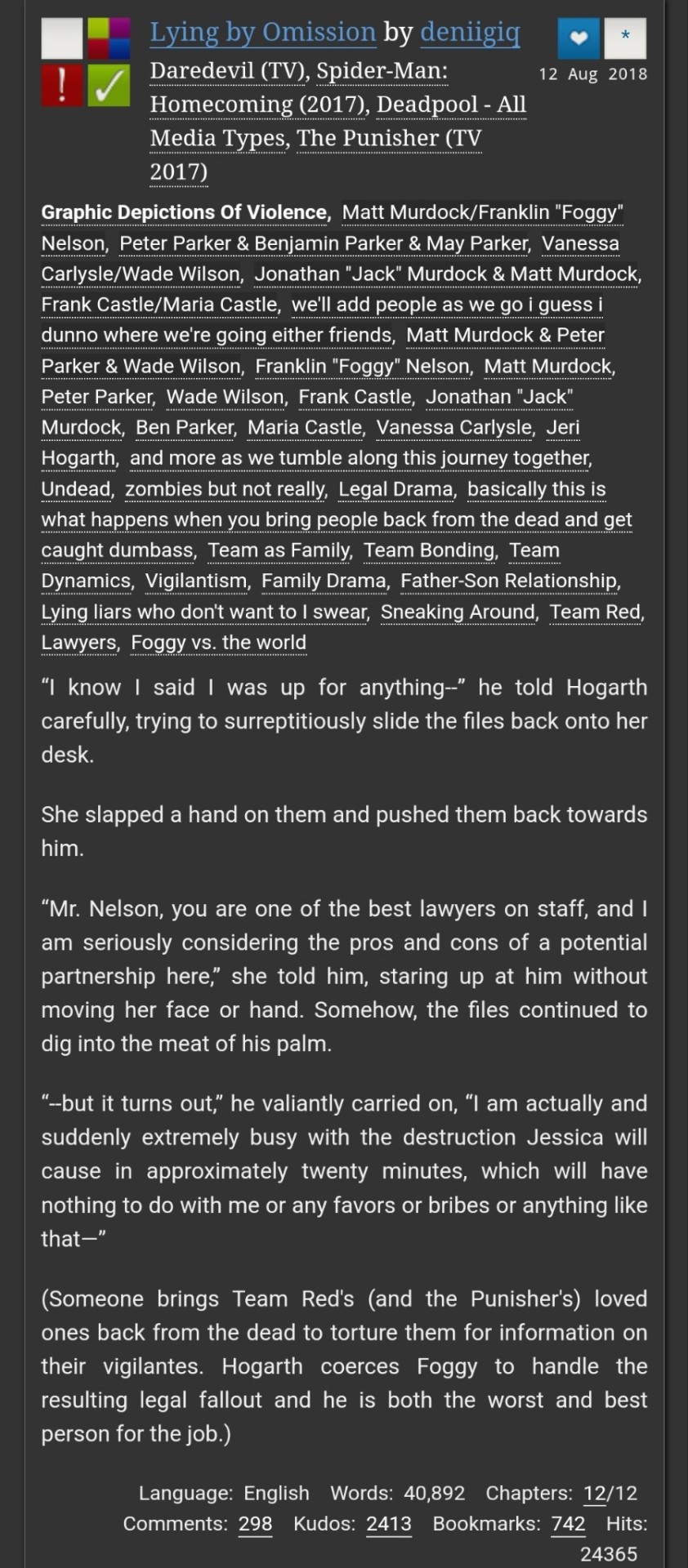
Link To The Fic
#franklin 'foggy' nelson#foggy nelson#matt murdock#peter parker#wade wilson#frank castle#jonathan 'jack' murdock#ben parker#maria castle#vanessa carlysle#jeri hogarth#legal drama#team as family#team bonding#team dynamics#vigilantism#family drama#team red#lawyers#matt murdock/franklin 'foggy' nelson#wade wilson/vanessa carlysle#frank castle/maria castle
11 notes
·
View notes